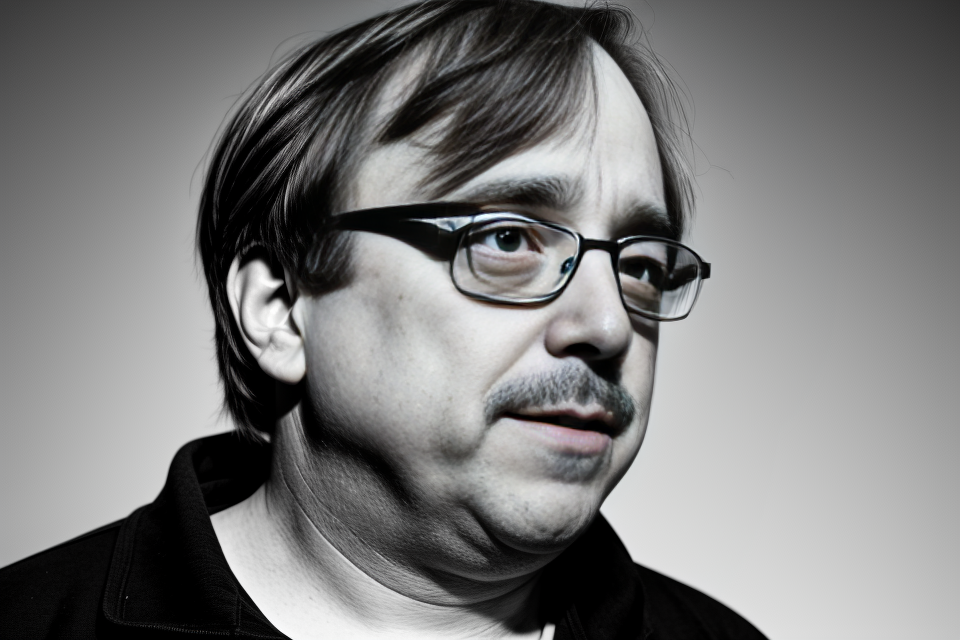Linus Torvalds, the creator of the Linux operating system, announced his decision to step down as the maintainer of the Linux kernel in 2018. This sparked curiosity and concern among the tech community. Why did Linus leave? In this article, we will explore the reasons behind his decision and the impact it had on the world of technology. We will delve into the challenges that led to his departure and the measures taken to ensure the continued success of the Linux kernel. So, buckle up and get ready to discover the fascinating story behind Linus’s departure from the Linux kernel.
Linus Torvalds stepped down as the sole maintainer of the Linux kernel in 2018 due to concerns about his ability to handle the increasing complexity of the project. He cited the need for more diverse and distributed leadership as the Linux kernel continued to grow and evolve. This decision was made to ensure the sustainability and longevity of the Linux kernel, which remains an essential component of the modern computing landscape.
The Importance of the Linux Kernel
A Brief History of the Linux Kernel
The Linux kernel is the heart of the Linux operating system, which powers millions of devices worldwide. It is an open-source software that is constantly updated and improved by a global community of developers.
The Linux kernel was first developed by Linus Torvalds in 1991, while he was studying at the University of Helsinki. Torvalds wanted to create a Unix-like operating system that was free and open source, and he decided to use the GNU General Public License (GPL) to distribute the software.
The first version of the Linux kernel was released in 1991, and it was a basic system that supported basic Unix functionality. Over the years, the Linux kernel has been constantly updated and improved, and it now supports a wide range of hardware and software platforms.
The Linux kernel has become one of the most widely used operating systems in the world, powering everything from smartphones and tablets to servers and supercomputers. It is used by individuals, businesses, and governments, and it has become an essential part of the technology infrastructure.
Despite its widespread use, the Linux kernel is still free and open source, and anyone can download and use it without charge. This has made it an incredibly popular choice for developers and users who want to create and use custom software without being restricted by licensing agreements or fees.
In conclusion, the Linux kernel is a vital component of the technology landscape, and its impact cannot be overstated. Its development and maintenance have been led by Linus Torvalds since its inception, but he recently stepped down from his role as maintainer of the Linux kernel. The reasons for his decision will be explored in the following sections.
The Linux Kernel’s Role in Modern Technology
The Linux kernel is a vital component of modern technology. It serves as the foundation for a vast array of devices, from smartphones and tablets to servers and supercomputers. The Linux kernel’s role in modern technology is multifaceted and critical to the functioning of the digital world.
One of the primary reasons the Linux kernel is so important is its versatility. It is an open-source operating system, which means that anyone can access and modify its source code. This flexibility has led to the development of countless custom distributions, each tailored to specific needs and purposes. Whether it’s a lightweight operating system for old computers or a specialized distribution for penetration testing, the Linux kernel can be molded to fit almost any requirement.
Another reason for the Linux kernel’s significance is its stability and reliability. It is renowned for its ability to run on a wide range of hardware, making it an ideal choice for mission-critical systems that require 24/7 uptime. The Linux kernel’s stability is a result of its rigorous testing and continuous improvement, as well as the dedicated community of developers who contribute to its development.
Furthermore, the Linux kernel plays a crucial role in the development of new technologies. It serves as a testing ground for experimental features and innovations, which can then be incorporated into other operating systems. The Linux kernel’s role in modern technology extends to areas such as cloud computing, where it powers the infrastructure of many of the world’s largest data centers.
Lastly, the Linux kernel is instrumental in driving collaboration and innovation within the technology industry. Its open-source nature fosters a culture of sharing and cooperation, encouraging developers from around the world to contribute to its development. This collaborative spirit has led to the creation of numerous software projects, many of which have become essential tools for developers and system administrators alike.
In conclusion, the Linux kernel’s role in modern technology is immense, encompassing its versatility, stability, reliability, and role in driving innovation. Its influence can be seen in a wide range of industries, from consumer electronics to enterprise software, and its importance only continues to grow as technology advances.
Linus Torvalds’ Role in the Linux Kernel
Linus Torvalds’ Contributions to the Linux Kernel
Linus Torvalds is widely recognized as the creator of the Linux kernel, which is the core component of the Linux operating system. As the lead developer and maintainer of the Linux kernel, Torvalds played a pivotal role in shaping the development of the Linux operating system.
Torvalds made numerous contributions to the Linux kernel over the years, including:
- Designing and implementing the basic architecture of the Linux kernel
- Developing the Linux kernel’s virtual memory system
- Creating the Linux kernel’s process management system
- Implementing the Linux kernel’s network stack
- Designing the Linux kernel’s file system hierarchy
- Integrating new hardware support into the Linux kernel
- Maintaining the Linux kernel’s compatibility with a wide range of hardware and software
Torvalds’ contributions to the Linux kernel were not limited to coding. He also played a key role in fostering a vibrant and diverse community of developers who contributed to the Linux kernel. Torvalds established a collaborative development model that allowed developers from around the world to contribute to the Linux kernel, which helped to ensure that the Linux kernel remained open, accessible, and free.
In addition to his technical contributions, Torvalds was also known for his forthright and sometimes controversial communication style. He was not afraid to speak his mind and was known for his blunt criticism of code and development practices. This approach was often seen as brash and abrasive, but it also helped to drive innovation and progress in the Linux kernel community.
Overall, Torvalds’ contributions to the Linux kernel were extensive and far-reaching. He played a key role in creating and shaping the Linux operating system, and his leadership and vision helped to make the Linux kernel one of the most successful and widely used open-source projects in history.
Linus Torvalds’ Leadership Style
Linus Torvalds is known for his leadership style that is both hands-on and visionary. He has always been actively involved in the development of the Linux kernel, constantly working on new features and improvements.
One of the key aspects of Torvalds’ leadership style is his ability to delegate tasks and responsibilities to other developers. He has a knack for identifying talented individuals and entrusting them with important tasks, which has allowed the Linux kernel to grow and evolve over the years.
Another important aspect of Torvalds’ leadership style is his commitment to open-source principles. He has always been a strong advocate of open-source software and has worked tirelessly to ensure that the Linux kernel remains free and accessible to all.
However, Torvalds’ leadership style has also been criticized for being autocratic and sometimes abrasive. He has been known to use strong language in email correspondence with other developers, which has sometimes led to controversy and disagreement within the community.
Despite these criticisms, Torvalds’ leadership style has been instrumental in the success of the Linux kernel. His ability to inspire and motivate other developers, combined with his technical expertise and vision, has helped to make the Linux kernel one of the most successful and widely-used open-source projects in history.
Reasons for Linus Torvalds’ Departure
Personal Reasons
Linus Torvalds’ decision to step down as the maintainer of the Linux kernel was influenced by several personal reasons.
- Health Concerns: Linus Torvalds has been known to have a grueling work schedule, often putting in long hours working on the Linux kernel. This workaholic lifestyle took a toll on his health, and he had to take a break from his work to focus on his well-being.
- Family Matters: Torvalds’ family life was also a factor in his decision to step down. He had to spend more time with his family, especially his children, who were growing up quickly.
- Burnout: Linus Torvalds had been working on the Linux kernel for over three decades, and the constant pressure to keep up with the fast-paced technological world was taking a toll on him. He felt burnt out and needed a break from the intense workload.
- Mental Health: Torvalds has been open about his struggles with mental health, and the stress of maintaining the Linux kernel was taking a toll on his mental well-being. He needed to take a step back to focus on his mental health and overall well-being.
These personal reasons contributed to Torvalds’ decision to step down as the maintainer of the Linux kernel, and he felt that it was time for him to take a break and focus on other aspects of his life.
Professional Reasons
Linus Torvalds, the creator of the Linux kernel, stepped down from his role as the maintainer of the Linux kernel due to a number of professional reasons. These reasons include the increasing complexity of the Linux kernel, the need for better management and organization of the development process, and the desire to focus on other projects.
Increasing Complexity of the Linux Kernel
One of the main reasons for Linus Torvalds’ departure was the increasing complexity of the Linux kernel. As the kernel continued to grow and evolve, it became more difficult for Torvalds to manage and oversee the development process. This complexity made it harder for Torvalds to make decisions and prioritize tasks, leading to delays in the development process and causing frustration among developers.
Need for Better Management and Organization
Another reason for Torvalds’ departure was the need for better management and organization of the development process. The Linux kernel is developed by a large and diverse community of developers, and it can be challenging to coordinate their efforts and ensure that everyone is working towards the same goals. Torvalds recognized that the Linux kernel needed a more structured and organized development process, and he felt that he was not the right person to lead this effort.
Desire to Focus on Other Projects
Finally, Torvalds stepped down from his role as maintainer of the Linux kernel because he wanted to focus on other projects. Torvalds has always been a prolific developer, and he has worked on a wide range of projects over the years. In recent years, he has become increasingly interested in other areas of technology, such as artificial intelligence and quantum computing, and he felt that it was time to move on from the Linux kernel and explore these other areas.
Overall, Linus Torvalds’ decision to step down as the maintainer of the Linux kernel was driven by a combination of professional reasons, including the increasing complexity of the kernel, the need for better management and organization, and the desire to focus on other projects. While Torvalds will continue to be involved in the Linux community, his departure marks a significant milestone in the history of the Linux kernel and the open-source movement.
The Impact of Linus Torvalds’ Departure
Short-Term Implications
- Disruption in Decision-Making Processes:
- Linus Torvalds’ departure meant that the Linux kernel community had to find new ways to make decisions.
- This could have caused confusion and delays in the development process.
- Increased Workload for Remaining Developers:
- With Linus Torvalds stepping down, the workload of maintaining the Linux kernel fell on the remaining developers.
- This could have resulted in an increased workload for these developers, potentially slowing down the development process.
- Difficulty in Maintaining Consistency:
- Linus Torvalds’ departure could have led to a loss of consistency in the development of the Linux kernel.
- This could have resulted in inconsistencies in the codebase, potentially leading to bugs and compatibility issues.
- Risk of Splintering the Community:
- Linus Torvalds’ departure could have led to a splintering of the Linux kernel community.
- This could have resulted in multiple forks of the Linux kernel, potentially leading to fragmentation and confusion.
Long-Term Implications
The decision of Linus Torvalds to step down as the maintainer of the Linux kernel has far-reaching implications for the future of the open-source community.
- Succession Planning: With Linus Torvalds stepping down, the Linux community must now focus on finding a suitable replacement to lead the development of the Linux kernel. This process is crucial for the long-term success of the Linux kernel, as it will ensure that the project remains in capable hands.
- Technical Expertise: Linus Torvalds’ departure will also impact the technical expertise available to the Linux kernel. As the creator of the Linux kernel, Torvalds brought a unique perspective and understanding of the codebase. His departure will leave a gap in technical knowledge, which will need to be filled by the new maintainer and the wider community.
- Community Leadership: Linus Torvalds has been a strong leader within the Linux community, and his departure will impact the community’s sense of direction and purpose. The new maintainer will need to step up and provide strong leadership to ensure that the Linux kernel continues to evolve and remain relevant in the rapidly changing technology landscape.
- Innovation: The Linux kernel has always been at the forefront of innovation in the technology industry. With Linus Torvalds’ departure, there is a risk that the pace of innovation may slow. However, the Linux community is full of talented developers, and it is likely that they will continue to push the boundaries of what is possible with the Linux kernel.
- Diversity and Inclusion: Linus Torvalds’ departure also raises questions about diversity and inclusion within the Linux community. The new maintainer will need to ensure that the Linux kernel remains an inclusive and welcoming environment for all contributors, regardless of their background or experience. This will be crucial for the long-term success of the Linux kernel, as it will ensure that the project remains diverse and able to draw on the talents of developers from around the world.
The Future of the Linux Kernel
Transition to a New Maintainer
Linus Torvalds, the creator of the Linux kernel, announced his decision to step down as the maintainer of the Linux kernel in 2018. This was a significant event in the history of the Linux kernel, and it raised questions about the future of the project. In this section, we will discuss the transition to a new maintainer and the challenges that it posed.
The Need for a New Maintainer
Linus Torvalds had been the sole maintainer of the Linux kernel since its inception in 1991. However, as the Linux kernel grew in size and complexity, it became increasingly difficult for him to manage it single-handedly. Torvalds had been trying to delegate some of his responsibilities to other developers, but the Linux kernel community had been slow to respond. As a result, Torvalds realized that he needed to step down as the maintainer of the Linux kernel to ensure its long-term success.
The Search for a New Maintainer
The search for a new maintainer was not an easy task. The Linux kernel is a massive project with thousands of contributors, and finding someone who could take over from Torvalds was not a simple task. The Linux kernel community had to look for someone who had the technical expertise, the leadership skills, and the ability to manage a large community of developers.
After a long search, the Linux kernel community found the perfect candidate in Greg Kroah-Hartman. Kroah-Hartman had been a prominent contributor to the Linux kernel for many years, and he had extensive experience in managing the Linux kernel’s stable releases. He was also a respected figure in the Linux community, and he had the necessary skills to take over from Torvalds.
The Transfer of Responsibility
The transfer of responsibility from Torvalds to Kroah-Hartman was not a straightforward process. Torvalds had been the sole maintainer of the Linux kernel for over two decades, and he had developed a unique relationship with the Linux kernel community. Therefore, the transfer of responsibility had to be handled carefully to ensure that the Linux kernel’s development continued smoothly.
Torvalds and Kroah-Hartman worked together to ensure a smooth transition. Torvalds stepped back from his role as the primary maintainer of the Linux kernel, and he focused on other aspects of the project, such as the development of new features. Kroah-Hartman took over as the primary maintainer of the Linux kernel, and he was responsible for managing the Linux kernel’s stable releases and ensuring that the Linux kernel remained stable and reliable.
The Challenges of the Transition
The transition to a new maintainer was not without its challenges. Kroah-Hartman had to deal with a large community of developers, and he had to ensure that everyone was working towards the same goal. He also had to manage the Linux kernel’s stable releases, which were critical to the Linux kernel’s success.
Kroah-Hartman faced several challenges during the transition. He had to deal with conflicts between different factions of the Linux kernel community, and he had to ensure that everyone was working towards the same goal. He also had to manage the Linux kernel’s stable releases, which were critical to the Linux kernel’s success.
Despite these challenges, Kroah-Hartman has done an excellent job as the new maintainer of the Linux kernel. He has managed to maintain the Linux kernel’s stability and reliability, and he has ensured that the Linux kernel continues to be a vital part of the technology industry.
Continued Development and Evolution of the Linux Kernel
The Linux kernel will continue to evolve and develop in the future, with the help of a diverse community of developers and contributors. Despite Linus Torvalds’s decision to step down as the maintainer of the Linux kernel, the project will not come to a halt. The Linux kernel is an open-source project, which means that anyone can contribute to its development. There are already many experienced developers who have been working on the Linux kernel for years, and they will continue to do so in the future.
Moreover, the Linux kernel is not just a project managed by a single person. It is a large and complex project that involves many different components, such as the kernel itself, the toolchain, the libraries, and the application programming interfaces (APIs). The Linux kernel is also part of a larger ecosystem of open-source software, which includes the GNU Compiler Collection (GCC), the X Window System, and many other tools and libraries.
Therefore, the future of the Linux kernel is not dependent on any single person, including Linus Torvalds. The Linux kernel will continue to evolve and improve, thanks to the efforts of the entire community of developers and contributors. The Linux kernel will continue to be the foundation of many operating systems, including Android, and will continue to be an essential component of the Internet of Things (IoT) and other emerging technologies.
FAQs
1. Why did Linus Torvalds step down as the maintainer of the Linux kernel?
Linus Torvalds stepped down as the sole maintainer of the Linux kernel in 2016 due to the increasing complexity of the project and the need for a more collaborative approach to management. He felt that his role as the sole maintainer was no longer sustainable and that the Linux kernel needed a more diverse set of maintainers to ensure its continued development and stability.
2. Who took over as the maintainer of the Linux kernel after Linus Torvalds stepped down?
After Linus Torvalds stepped down as the sole maintainer of the Linux kernel, a group of prominent developers in the Linux community were named as co-maintainers. This group includes Greg Kroah-Hartman, Michael Wysochan, and Matthew Garrett, among others. Together, they are responsible for managing the Linux kernel and ensuring its continued development and stability.
3. Did Linus Torvalds completely leave the Linux kernel community?
No, Linus Torvalds did not completely leave the Linux kernel community. While he stepped down as the sole maintainer of the Linux kernel, he continues to contribute to the project and participate in the development process. He remains an important figure in the Linux community and continues to provide guidance and support to the co-maintainers and other developers working on the Linux kernel.
4. What impact did Linus Torvalds’ decision have on the Linux kernel community?
Linus Torvalds’ decision to step down as the sole maintainer of the Linux kernel had a significant impact on the Linux kernel community. It marked a shift towards a more collaborative approach to management and highlighted the importance of diversity and inclusion in the development process. It also led to a renewed focus on code quality and stability, as well as a greater emphasis on security and performance. Overall, Linus Torvalds’ decision was seen as a positive step towards ensuring the long-term viability and success of the Linux kernel.



